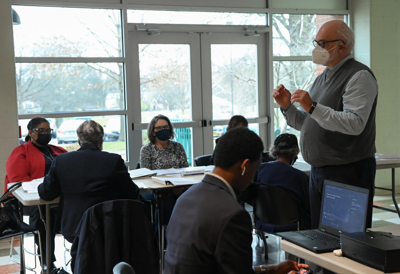Whitney Pastorek stepped down on Saturday after three months as chair of the steering committee for the city’s latest participatory budgeting cycle. The committee was tasked by the mayor’s office with approving guidelines that would govern a years-long process to solicit, approve and fund city projects from a budget of $10 million.
Nashville first experimented with participatory budgeting in 2021, when the Metro Council allocated $2 million to fund projects in Bordeaux and North Nashville proposed and voted on by residents. Another $2 million came in 2022. This money funded playground equipment, bus shelters, air conditioning at Looby Community Center and speed bumps in Bordeaux Hills, among other improvements. The city touts the program as citizen-led direct democracy. Critics, including some former participants, describe participatory budgeting as an overly bureaucratic and time-consuming process that delays obvious infrastructure improvements.
“I had serious moral and ethical concerns that I was not able to reconcile,” Pastorek tells the Scene a few days after she stepped down as chair. “I thought this would be a genuine, community-driven process in which a room full of people would talk about their values and the priorities of their individual community. Instead, we were given the arduous and artificial task of editing preexisting guidelines from previous cycles and a timeline that was accelerated and compressed to meet the administration's needs.”
Fabian Bedne, the mayor’s community development manager, has overseen all three participatory budgeting cycles. He describes bureaucratic constraints as a necessary element of participatory democracy.
“Democracy is sometimes messy, and part of public service is working constructively with others, establishing clear and transparent processes that maximizes the number of people who can participate, and being diligent about complying with legal and regulatory requirements — especially when we’re spending millions of taxpayer money,” Bedne tells the Scene in a statement. “Those are fundamental principles in participatory budgeting, and we won’t compromise on those. Governing by fiat or dictatorship is certainly more efficient.”
Pastorek tells the Scene that the steering committee had no sway over the city’s decision to earmark 7 percent of the $10 million allocation for overhead, nor were they consulted when the city awarded public relations firm Hall Strategies a contract worth more than $600,000 to promote the project. She took issue with the firm, which represented developers during displacements at RiverChase Apartments in the fall and represents Bristol Motor Speedway in its ongoing effort to land a NASCAR deal at The Fairgrounds Nashville. She chafed at the committee’s tight timeline as well as meetings’ functionality, specifically Bedne’s decision to bring on a facilitator whose responsibilities overlapped with Pastorek’s role as chair.
Metro Legal and Finance has kept the committee to a strict timeline because funding originated from the American Rescue Plan, which stipulates that federal money must be allocated by the end of 2024. As chair, Pastorek heard concerns about whether the city had freed itself from such constraints by first categorizing that money as revenue replacement, then pulling $10 million from the city budget.
Ben Eagles, a senior adviser for the mayor, defended the process as less arduous than the existing path to infrastructure improvements: approval through Metro Council.
“These projects could be funded through the traditional lengthy red-tape route of a capital improvements budget, then a capital spending plan then a vote by Metro Council," Eagles tells the Scene. "But PB allows residents to have a direct say in what gets done in their neighborhood without relying on priority lists of department heads or the ear of a council member or the advocacy of a mayor."
Pastorek formally resigned after the steering committee had approved guidelines to govern the remainder of the participatory budgeting process. Jason Sparks will replace Pastorek as chair of the steering committee, which now chooses another group made up of 35 budget delegates, one from each council district, who will refine submitted ideas into a ballot of projects for a citywide vote in the fall. The window for project submissions closes on June 1.





